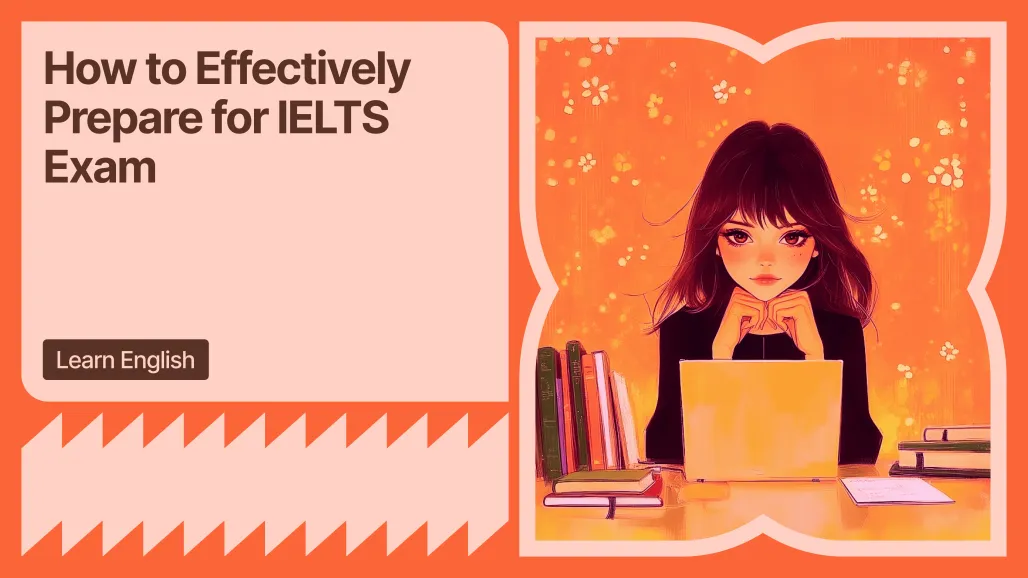How to Effectively Prepare for IELTS Exam

Top tips and strategies to effectively prepare for the IELTS exam, organize your study plan, and improve your chances of success.
IELTS Exam Structure
Key Skills Required
Trickiest Parts
Best Tips and How to Organize Your Preparation
Improve Essential Skills for IELTS with WholeReader
Conclusion
IELTS Exam Structure
The IELTS (International English Language Testing System) is a globally recognized English proficiency test. There are two types of IELTS exams: General and Academic. The General IELTS focuses on everyday English for work and immigration, while the Academic IELTS assesses English proficiency for higher education and professional settings.The IELTS exam assesses a candidate's ability to communicate in English. It is divided into four key sections:
1. Listening (30 minutes) Candidates listen to four recordings (conversations and monologues) and answer 40 questions.
2. Reading (60 minutes) 40 questions based on three long reading passages (for Academic IELTS) or texts taken from everyday life (for General Training IELTS).

3. Writing (60 minutes)
- Task 1: A short report based on a graph, table, chart, or diagram (for Academic IELTS), or writing a letter (for General Training).
- Task 2: An essay response to a point of view, argument, or problem.
4. Speaking (11-14 minutes) Three parts — an introduction and interview, a long turn (where candidates speak on a given topic), and a discussion related to the topic.
Key Skills Required
- Listening: Active listening, ability to grasp key ideas, and attention to detail.
- Reading: Skimming, scanning, identifying main ideas, and interpreting data.
- Writing: Coherence, clarity of argument, and task-specific responses.
- Speaking: Fluency, pronunciation, vocabulary range, and clarity.
Trickiest Parts
- Listening: It can be challenging to keep up with fast speech or different accents.
- Reading: Managing time and interpreting complex texts within the given time limit.
- Writing: Task 2 (essay) often poses difficulty due to the requirement for logical structure, persuasive argumentation, and clear language.
- Speaking: The pressure of the one-on-one interview can make it difficult to maintain fluency and composure.
Best Tips and How to Organize Your Preparation
Preparing for the IELTS exam requires focus, strategic planning, and regular practice. Here are some of the best tips and recommendations to help you get started and stay on track with your preparation process.
1. Understand the Test Format: Before diving into study materials, familiarize yourself with the structure of the IELTS exam. Knowing what to expect in each section (Listening, Reading, Writing, Speaking) will help you target your preparation effectively.
- Tip: Take time to go through the official IELTS practice papers to understand the types of questions you'll face.
2. Take a Practice Test to Identify Your Weak Areas: Start your preparation by taking a full-length practice test. This will highlight your strengths and weaknesses across the four sections. Based on your results, tailor your study plan to focus more on areas where you need improvement.
- Tip: Use online resources to find free or paid practice tests that simulate real exam conditions.
3. Build a Study Schedule: Set a daily or weekly study schedule that allocates time for each of the four IELTS sections. Stick to your plan, but also be flexible in adjusting it based on your progress.
- Tip: Dedicate more time to your weakest areas, while still practicing your strengths to maintain balance.
4. Improve Your English Skills: Beyond test-specific practice, immerse yourself in English as much as possible. Engage in activities like:
- Reading: Read English newspapers, books, and articles to improve reading speed and comprehension.
- Listening: Watch English news, podcasts, or shows to become familiar with different accents and speech patterns.
- Speaking: Speak in English with friends or language partners to boost your confidence and fluency.
- Writing: Practice writing essays and reports to enhance your writing fluency and structure.

5. Practice Time Management: Time management is critical, especially for the Reading and Writing sections, which have strict time limits. Practice completing tasks within the allotted time frame to improve your speed and accuracy.
- Tip: Use a timer when completing practice tests to simulate the real exam environment.
6. Focus on Vocabulary and Grammar: Having a good command of vocabulary and grammar is essential for success in IELTS. Expand your vocabulary by learning new words daily and practice using them in sentences. Focus on using a wide range of grammar structures accurately.
- Tip: Keep a vocabulary notebook and review it regularly.

7. Work on Exam Strategies: Develop specific strategies for each section:
- For Listening, practice note-taking and predict answers before hearing them.
- For Reading, learn to skim and scan quickly for key points.
- For Writing, plan your essays and reports before you start writing.
- For Speaking, practice answering common IELTS questions and develop strategies for handling difficult or unexpected topics.
8. Stay Relaxed and Positive: Preparing for IELTS can be stressful, but it’s important to stay calm and maintain a positive attitude. Take regular breaks, get enough sleep, and stay motivated throughout your preparation.
Improve Essential Skills for IELTS with WholeReader
Preparing for the IELTS exam can be daunting, but WholeReader offers an immersive and highly efficient way to build the necessary language skills. Combining text with human-narrated audio and features like reading level tests, an in-built dictionary, goal setting, and more, WholeReader helps you improve your listening, reading, writing, and speaking abilities. Additionally, our books are narrated with different accents—British, American, Australian, Indian, and more—to match each book's origin, providing real-world accent exposure. Here’s how these features can boost your IELTS preparation.
1. Listening: Enhance Your Listening Skills with Varied Accents
In the IELTS Listening section, you need to understand a variety of English accents and speech patterns. WholeReader's human-narrated audio is a perfect match, with narrations featuring diverse accents—British, American, Australian, Indian, and other—depending on the origin of each book. This not only immerses you in authentic spoken English but also prepares you for the different accents you will encounter in the exam.
- How WholeReader Helps: Listening to narrations in various accents simulates the exam's diverse listening tasks, where you might hear speakers from different parts of the world. Paired with the synchronized text, this feature sharpens your ability to comprehend spoken English in different dialects and contexts, giving you a significant advantage in the Listening section.

2. Reading: Improve Comprehension with Adaptive Reading Materials
The IELTS Reading section requires strong comprehension skills across a variety of topics and text types. WholeReader’s book filter by reading level and genres allows you to tailor your reading materials to match your ability and interests. Our library offers a mix of fiction and non-fiction, including philosophical and scientific books, which allows you to practice with texts similar to those found in the exam.
- How WholeReader Helps: By using the multiple-choice reading level test, you can determine your current reading level and find books that suit your abilities, enabling steady progress in reading comprehension.The test can be retaken to track the progress you have made in expanding your vocabulary. The in-built dictionary also allows for quick lookup of unfamiliar words, making it easier to improve your vocabulary and understand texts more deeply. Exposure to a wide variety of genres and complexity mirrors the variety of passages in the IELTS exam.

3. Writing: Expand Your Vocabulary and Structure with Book Reviews
To succeed in the IELTS Writing section, you need to be able to construct well-organized essays with a clear argument and varied vocabulary. WholeReader’s blogger feature lets you write and publish book reviews, offering practical writing practice that builds the critical thinking and expression needed for Task 1 and Task 2 in the exam.
- How WholeReader Helps: Writing reviews encourages you to engage deeply with the material, helping you practice how to articulate thoughts and structure ideas coherently—skills essential for the IELTS Writing section. Additionally, the notes-taking feature allows you to collect important points or new vocabulary as you read, which helps organize your ideas before writing. The in-built dictionary further supports vocabulary expansion, allowing you to improve both your lexical resource and grammar skills for essay writing.

4. Speaking: Master Fluency and Expression with Natural Accent Exposure
The Speaking section of IELTS tests your fluency, pronunciation, and ability to express ideas clearly. WholeReader’s human-narrated books, with varied accents, expose you to natural, fluent English speech, helping you develop your own speaking skills. Whether the narrators speak with British, American, or other accents, this exposure will improve your ability to understand and use diverse forms of spoken English.
- How WholeReader Helps: Listening to different accents in natural conversation-style narrations trains your ear for fluency, rhythm, and pronunciation. You can practice by listening to and repeating passages to improve your pronunciation. By consistently engaging with spoken English across a range of accents, you become more comfortable discussing a variety of topics and expressing your ideas, as required in the IELTS Speaking test.

5. Overall Improvement: Stay on Track with Goal Setting and Activity Tracking
WholeReader’s goal-setting and activity tracker features ensure that you maintain a consistent study plan, a key factor for IELTS preparation. By setting specific goals related to reading, writing, or listening, you can focus on targeted areas and monitor your progress over time, making adjustments as needed.
- How WholeReader Helps: Set reasonable daily or weekly goals to stay on track with your preparation. The activity tracker helps you see how much time you’ve devoted to reading, allowing you to maintain a balanced approach to your IELTS preparation.

Conclusion
Preparing for the IELTS exam requires a blend of effective planning, focused practice, and a positive mindset. By understanding the test format, identifying your weaknesses, improving your overall English skills, and practicing regularly under exam conditions, you can significantly boost your chances of achieving a high score. Staying organized, managing your time efficiently, and seeking constructive feedback will further enhance your preparation. With determination and consistent effort, you will be well-equipped to face the IELTS exam confidently and successfully.
Use WholeReader as part of your IELTS preparation strategy, and take your language skills to the next level while enjoying an immersive reading experience.
